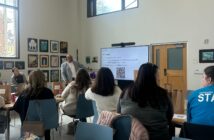
Madison Peterson-Porta
It’s the first day of class for the semester. My laptop is open and I’m waiting expectantly for the lecture to begin, wondering if this will be a manageable class or a GPA-breaker. I’m sitting, staring at the board and the clock, anticipating. The professor walks in, and I hear his fateful words.
“Please close and put away your laptops and phones. I don’t want to see them. Electronic devices are unnecessary right now and distracting. You can look at them at the end of class.”
I groan inwardly. My semester just became a lot harder.
Most of us have had a professor who only allowed old-fashioned pen and paper for note taking in class. They say it while staring at the Apple and HP logos sitting in front of most students as if the screens carried the plague or death themselves.
If you haven’t heard the call to put away your electronic devices, then you are in the minority. Or you’re hidden away in a large engineering lecture.
As a student in the College of Arts and Sciences, I am all too familiar with the devastating first-day-of-class decree to put away laptops and other devices for the next 50 minutes.
I am a firm proponent of technology in the classroom. I think laptops can be utilized in such positive ways to facilitate note taking, healthy discussion and grade-saving review opportunities before class. Laptops aren’t just sufficient for the classroom in 2018, but are absolutely necessary.
There is a fine line, however, between what we can do positively with our computers and what is often done negatively.
In an attempt to get professors to lift their bans on laptops in the classroom, students might have to compromise and stop using their laptops to text or scroll through Facebook during class. That way, all professors will feel comfortable lecturing in front of a room of students sitting behind screens.
I believe many professors at Lehigh assume open screens in front of students is equivalent to the scene in “Ferris Bueller’s Day Off” when the hapless high school teacher stands in front of a room full of bored teenagers ululating, “anyone, anyone?”
But, instead of daydreaming or trying to count how many pieces of gum are under their desk, students scroll through Facebook or vote on the ‘Maxim Cover Girl’ contest: 2018.
If students are engaging in these activities during class, their laptops are obviously a distraction. However, it is possible to download and apply programs like free parenting software that regulates one’s use of the internet during a specific period of time.
Professors also believe laptops might discourage class discussion. Many professors require vocal involvement, where lack of participation can result in a significant grade detraction. Asking students to put their laptops away will not encourage shy students to become more talkative during discussions.
When laptops are banned as a way of receiving information, students are left painstakingly writing notes as quickly as possible, while simultaneously trying to keep up with the class conversation, when they could be typing.
Professors might argue against laptops in the defense of practicing writing by hand. Beyond the legibility of your signature, the majority of the world doesn’t care whether you know shorthand or whether you got an A in penmanship. In fact, as far back as 2007, public schools in New Jersey stopped teaching script as a class.
Beyond the fading reality of handwriting, anyone who’s taken notes on a laptop knows that typing on a keyboard is neat and efficient. For many years during my academic career, I have been faced with what I call the mile-a-minute professor who leaves a student at the end of a lecture with hand cramps and pages of barely legible notes.
In the digital age, today’s students are less equipped with note-taking skills by hand. Whether that is good or bad isn’t relative to this discussion. For better or worse, typing is a more highly-praised commodity, and in the digital age, it is a necessity in the workforce.
Forced to write by hand, students lose valuable time and the ability to fluently participate in class discussions. They might struggle though handwriting issues, too. In addition, students waste valuable review time when they must copy notes from paper over to their laptops.
If college is to prepare us for the future, then laptops seem all the more reasonable.
—
Madison Peterson-Porta, ’19, is an associate lifestyle editor for The Brown and White. She can be reached at map419@lehigh.edu.





Comment policy
Comments posted to The Brown and White website are reviewed by a moderator before being approved. Incendiary speech or harassing language, including comments targeted at individuals, may be deemed unacceptable and not published. Spam and other soliciting will also be declined.
The Brown and White also reserves the right to not publish entirely anonymous comments.
3 Comments
I appreciate that a laptop offers some apparent advantages for taking notes. Despite the convenience (including the ability to search the finished notes), most research indicates that this is less effective for the student — even those students who just take notes, avoiding facebook or other apps. (The biggest disadvantage, apparently, is the difference between ear-to-hand typing and actually processing information at the time.)
Laptops Are Great. But Not During a Lecture or a Meeting. – The New York Times https://www.nytimes.com/2017/11/22/business/laptops-not-during-lecture-or-meeting.html
Attention, Students: Put Your Laptops Away
https://www.npr.org/2016/04/17/474525392/attention-students-put-your-laptops-away
Using laptops for notes – Colin Purrington
https://colinpurrington.com/tips/laptop-notes
Evidence mounts that laptops are terrible for students at lectures – The Verge
https://www.theverge.com/2017/11/27/16703904/laptop-learning-lecture
Came to the comments section to say the same–I cite these studies in my course policies as to why I don’t allow laptops in the classroom *unless* they are exclusively being used to access an eBook because I realize this is a cheap way to get course texts. I still mandate that they take handwritten notes, though. Time and time again, studies prove that students do not synthesize information when they type notes and are worse off.
As a final note, this is poor reasoning: “students waste valuable review time when they must copy notes from paper over to their laptops.” — this copying over *is* review time.
Well…it’s nice for 1985.
I don’t teach in 1985, though. I teach in 2018 (where there actually aren’t many classes taught as straight lectures anymore anyway, and if you’re talking about note-taking in the extant lecture courses, the notes are already up in pdf form anyway because they’re the ppt slides, and odds aren’t bad you can just go back and watch parts of the lecture again anyway because it’s up as a video). In 2018, nobody in the room is the world expert. Even if you hire a world expert, you’re getting one piece of the world’s expertise. If it’s a big field, you’ve got a tiny piece of the world’s expertise in the room, and nothing more.
When I ask a question, and nobody has the answer, I want them to find out. Like — find out right now. There’s no reason to wait. Unfortunately, they’ve all been frightened into keeping the laptops closed. So for the first few weeks of class, I have to coax them into believing that they’re allowed to use their fingers. If I ask a question, and no one knows, and they’re staring at me, I say, okay, so find out, and they sit there until I say “it works better when you use the keyboard”, and then very tentatively they’ll go start looking. (Then they’ll sit there staring at the page and I have to remind them that I’m not a telepath and they have to report what they’ve found out loud.)
What emerges is that their search skills suck, because they’ve been trained with curricula aimed not at making them smart but at making sure they pass standardized tests so the districts aren’t defunded, also at shielding districts from trouble with kids who’ve gone wandering the internet for a research project and wound up at porn sites or something. So they’ve often worked with canned research spaces, and they don’t know how to just go out in the online world and *find reasonable answers* from knowledgeable people. Or find that nobody has an answer written up and posted somewhere, and find the actual humans most likely to know, and *ask them*. It’s a considerable shock for some of the students, that you can find an expert source and ask the question on twitter and actually get an answer before the class ends.
So that becomes part of the course, too. How to frame a question and then go answer it. On your own. Like you’ll have to do the rest of your life, if you actually want to know things and don’t want to have a stagnant mind and be phoning it in by the time you’re 40.
If a kid (who sometimes isn’t a kid anyway, but a young adult with children or immigrant parents to support) finds something online that’s smarter than what I’m saying during a class, I want to hear about it right then. I am totally happy with their checking out of the conversation for long enough to fact-check me or follow a thought on their own. I am also fine with reworking the next class to deal with something terrific and germane that the student has found, so that they see the thing and develop context for it, and can have a chance to examine it and think critically about it.
Are there kids who get distracted and wander off to shop or play games or whatever? Yes. There are. I tell them right up front that when students decide that this is what they’re going to do, the average grade drop is about a letter grade, though sometimes it’s more; they’d also better sit in the back where they’re not going to distract students who’ve shown up to work. I also tell them I know what they or other people are paying for them to be sitting in the room, but if they want to throw it away, that’s entirely up to them. I’m not their mom. I also don’t give points just for showing up in the room, so there’s not much point to screwing around in the classroom rather than staying home and doing it more comfortably on a couch. Also, I do not reteach classes during office hours for people who were there in class in body only. Normally I get a few who decide their fantasy sports league or whatever is still more important, and sometime in the middle of the course, as their grades are crashing and burning, I talk to them individually and remind them that they’re doing it to themselves, which they know, and then usually they cut it out.
So yeah. I really see no reason to pretend that the classroom walls actually exist.
As for note-taking…the last thing I want, as a teacher, is to hear my words coming back to me. I already know what I said. I’m not there to make drones or teach a catechism. I want the students thinking and coming up with their own words and ideas. If writing down what I’m saying, or the conversation in the room, helps them do that, helps them learn, then fine. But I don’t teach stenography and I don’t expect or want a room full of students thinking it’s their job to produce a transcript.